Comunidades Eclesiales de Base (CEBs) in the 2023 Synod Synthesis Document, By Pedro Pierre, Guayaquil, Ecuador. November 2023. https://smallchristiancommunities.org/
The Synthesis Document of the recent Synodal Assembly meeting in the Vatican in October 2023 makes us see that yes, the Comunidades Eclesiales de Base (CEBs)2 are “a seed”’ that has become “a big bush.” With us and many other like-minded groups, Synodality is here to stay.
A. Let’s Notice First
- The Synthesis Document is the memory of the reflections that were given during the Synodal Assembly in Rome in October, 2023 based on the Working Document delivered by the Secretariat Team of the Synodal Assembly.
- The Working Document was the result of the contributions of the dioceses and the summaries of the National and Continental Bishops Conferences.
- The Synthesis Document will now be reflected upon in parishes and dioceses (and SCCs/CEBs) to reflect and choose what needs to be done/what needs to change as we move towards greater synodality.
- These reflections and proposals will be reviewed again at a Second Synodal Assembly in Rome in October, 2024. (Ed: in order to feed into this they must be submitted early in the second quarter, 2024.
B. Pope Francis Has Won His Bet to Put the Church in a Process of Synodality
- This process began in 2015 with his famous speech on the importance of Synodality (17 October, 2015), on the occasion of the celebration of the 50th anniversary of the first Synod convoked by Pope Paul VI.
1 Translated from the original Spanish: Las CEBs en el Documento de Síntesis.
2 In Spanish: Comunidades Eclésiales de Base (CEBs) or simply Comunidades de Base (CBs).
In Portuguese-speaking Brazil: Comunidades Eclesiais de Base (CEBs).
In Portuguese-speaking Africa: Pequenas Comunidades Cristãs (PCCs).
In French: Communautés Ecclésiales de Base (CEBs) or simply Communautés de Base (CBs) or Petites Communautés Chrétiennes (PCCs).
Also In Spanish: Pequeñas Comunidades Cristo (PCCs).
In English the most common terms are Small Christian Communities (SCCs), Basic Christian Communities (BCCs), Basic Ecclesial Communities (BECs) and Base Communities (BCs). - The process then began in Rome on 10 October, 2021. The final sentence of his speech is very striking: “Come, Holy Spirit, you who raise up new tongues and put words of life on our lips, deliver us from becoming a museum church, beautiful but mute, with much past and little future. Come into our midst, so that in the synodal experience we do not allow ourselves to be overwhelmed by disenchantment, we do not dilute prophecy, we do not end up reducing everything to sterile discussions. Come, Spirit of love, open our hearts to listen. Come, Spirit of holiness, renew the holy People of God. Come, Creator Spirit, renew the face of the earth.”
- “The way this whole process has been woven has generated a collaboration that becomes irreversible.”
- At the end of October, 2023 the first session of the Synodal Assembly of some 400 delegates came to an end, including lay women and men, priests and nuns with the right to speak and vote.
- Pope Francis managed to get everyone to talk and listen to each other based on a Working Document that summarized the contributions of groups, parishes and dioceses from all over the planet.
- The result of this Synodal Assembly is a Synthesis Document that collects the reflections made during four weeks in groups of a dozen people gathered around about 35 round tables. There was no shortage of moments of prayer, celebration and pilgrimages.
- The title and greeting of this Synthesis Document is the first thing that is novel and striking. “The Synodal Church in Mission”, a title that recalls the theme of the Fifth Episcopal Conference of Aparecida (Brazil) in 2007 where the coordinator of the Secretariat Team was Jorge Bergoglio himself. The simple greeting puts women first: “Dear sisters, dear brothers.”
- The relatively brief Synthesis Document reflected the desire to move decisively forward in Synodality despite the strong resistance not only of a dozen cardinals particularly opposed to the choices of Pope Francis, but also the reluctance of many bishops, the rejection of many parish priests and the disinterest of many Catholics who prefer a quiet and sleepy Christianity.
- The challenge of the Synodal Process has been launched and we have a year to start processing it (Ed: now just another month or two, to meet deadlines for collating of input) at all levels.
- The CEBs (or Small Christian Communities), which the (Bishops’) Ecclesial Assembly of Latin America and the Caribbean held in Mexico (CELAM) in 2021 described as a “synodal Church experience,” have a particular responsibility in this process to set in motion another way of being church as we have begun to be.
C. The CEBs & SCCs in the Synthesis Document
1. It is true that the CEBs are mentioned directly only once in the Synthesis Document:
“Widespread in many parts of the world, Base Communities (also called Grassroot Communities) or Small Christian Communities encourage practices of listening by and among the baptized. We are called to enhance their potential, also exploring how they can be adapted to urban contexts.” (16, m)
2. We can feel that CEBs are included indirectly in another two paragraphs where the document speaks of “new communities”’ and “catechists” as animators of Christian Communities: “The most precise configuration of councils and councils with representatives of Lay Associations, Ecclesial Movements and new communities”. (10, i) “In many regions, the life of Christian Communities and the mission of the Church depend on the figure of catechists.” (8, e)
3. But several important aspects of such an assembly are characteristic of CEBs
- Group meetings around a round table that create equality, closeness, trust. (1, c)
- The working method: “’See, Discern and Act.”
- The importance given to prayer and the Word of God.
- The option for the poor: “Learn from them” because “the similarity of their life to that of the Lord makes the poor heralds of a salvation received as a gift and witnesses of the joy of the Gospel”. (4, h)
D. Reflections and Questions To Work On in Our CEBs and SCCs
1. Convince many people that:
- As a church we need to improve substantially,
- Synodality is a valid way to achieve a more evangelical Church.
- We can undertake it with confidence.
2. On the basis of the Synthesis Document of the Synodal Assembly, we ask ourselves:
See:
- What are the biggest challenges and problems in our church? And where do they come from?
- What aspects of our church do we think are important to improve or change, and for what reasons?
Discerning/Illuminating:
- What do we mean by Synodality and what are its main characteristics?
- Which points of the document stand out to us the most and for what reasons?
Act:
- What paths proposed by the document seem to us to be priorities for the renewal of our church and its service in society?
- How can we achieve this in Synodality?
**
Pierre Riouffrait, 80 years old. This is my testimony: Synodality is the implementation of the Church of the poor as a Church in the hands of the laity of which the poor are the protagonists. This is the new ecclesial model represented by the CEB, qualified by the Ecclesial Assembly of Latin America and the Caribbean (Mexico, 2021) as a “synodal Church model.” The CELAM Document, on this topic, has been recognized by the Pope as a “laboratory of Synodality in the Church.” https://www.religiondigital.org/opinion/futuro-marcha-America-Latina_0_2529647029.html
Pedro Pierre: “Latin America is the ‘laboratory’ of a new way of living both in the Church and in society”
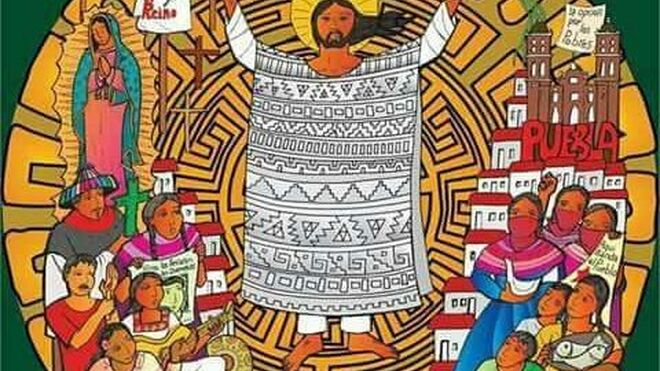
“On a social level, ‘Indigenous Well Living’ is a global alternative social model… close to ecclesial “synodality”. But this is another topic”
“I planned to stay ten years in Ecuador. The future was going to be longer than I thought. Having stayed 11 years in Ecuador, I notice different options that have marked my life and my pastoral work”
05.02.2023 | Peter Pierre
Who I am?
I am Pierre Riouffrait , son of small farmers from a village in Haute Loire, in Auvergne. After studying at the Major Seminary of Puy en Velay, I was ordained a priest in 1969. Currently in Guayaquil, Ecuador , I am happy to live 80 years, since June 2022.
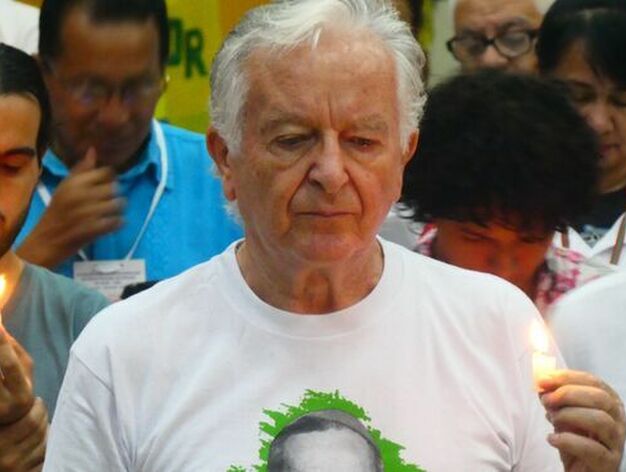
1976: Departure for Latin America, for Ecuador
It was at the call of an Ecuadorian priest, Homero Poveda, known at the Major Seminary, that I decided to go to work in Ecuador . I had a 2-year experience (1964-66) in Algeria as a teacher in a primary school in a poor neighborhood of Algiers. My concern for the Third World was also fueled for several years by my participation in activities with the CCFD (Catholic Committee against Hunger and Development) in Paris. The son of peasants, I felt a call to be in solidarity with the poor of Latin America.
Ecuador, Guayaquil: Meeting with the poor
I planned to stay ten years in Ecuador. The future was going to be longer than I thought. Having spent 11 years in Ecuador, I notice different options that have marked my life and my pastoral work.
The option for CEBs on the Medellín line
From the beginning of my arrival in Guayaquil, I had the opportunity to join a team of 6 priests who worked in the line of Base Ecclesial Communities (CEB) and Liberation Theology with Monsignor Leonidas Proaño , “Bishop of the Indians” in the diocese of Chimborazo, in the Andes.
Jesus Christ is followed well only in living communities. This line of action comes from the Second Vatican Council and the Document of the Second Latin American Episcopal Conference gathered in Medellín, Colombia, in 1968.
The option for the poor
In fact, this option consists of first taking up the causes of the poor. It is not only about being with the poor, but also about acting with them, thinking according to them and believing like them… for the reason that without the poor the Church is not faithful to Jesus Christ nor can society find a satisfactory path. This was Jesus’ life choice.

The option for the Kingdom as the “only absolute”
This was the choice of the CEBs when they began to exist in Brazil in 1955. This choice was confirmed by Pope Paul VI in 1975 : “In fact, the Kingdom is the only absolute; everything else is relative” (The Gospel Announcement).
The option for the laity
This was also the intuition of the Council : That the laity be protagonists in the Church. This is the option and practice of the CEBs. It is about returning to the mission of all the baptized as “prophets, priests and pastor-kings.”
The option for the ‘vital’ method of the CEB
It is a 3-step process: “See, Judge, Act and Celebrate” . First, it was the working method that the JOC (Catholic Workers’ Youth) had begun to use, then the Council (Joys and Hopes), finally the great Documents of the Latin American Church. If we do not start from current reality, we are not going anywhere, but to confusion and failure or superficiality.
1987-89: Pause in Rome for studies
For 2 years I studied ‘Dogmatic Theology’ at the Gregorian University with a final ‘thesis’ on the option for the poor of the ‘Conclusions of Puebla’ (Mexico), headquarters of the 3rd Latin American Episcopal Conference (1975). This option is valid both in the Church and in society .
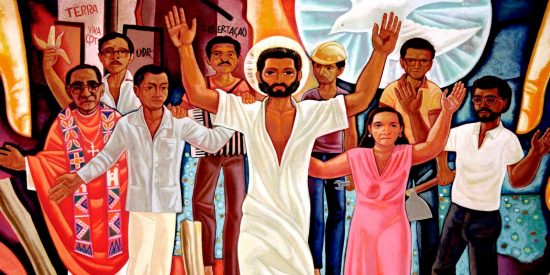
1989-97: Nicaragua, experience of a Church of the poor (Pope John XXIII, in 1961)
This is the experience of the pastoral line of the diocese or Vicariate of Bluefields, capital of the department, on the Caribbean Coast: Working with and from the laity to make the “dream of Pope John XXIII” a reality.
I was in charge of a very large parish in a very rainy tropical region: 2,700 km 2 and about 120,000 inhabitants. (For comparison, the Haute Loire department covers 5,000 km2).
The city center had 15,000 inhabitants and the Eucharist was celebrated there 2 Sundays a month . Then there were about thirty towns linked by dirt roads where the Eucharist is quarterly . The rest is made up of 90 hamlets that can be reached by mule or boat: they have one Eucharist a year .
In fact it is a parish in the hands of the laity. All the communities met every Sunday and prepared the sacraments. There were over 3,000 ministers divided into 27 different ministries, 4 married deacons, 4 nuns and a priest. Pastoral care was organized into religious, social and civic services. All ministers followed a full 3-day annual training.
Everything was decided at the annual 3-day parish assembly with 2 representatives from each of the 130 communities.
The role of the priest was to accompany the Communities, visit them, organize the training of ministers, celebrate the sacraments. I spent as much time visiting the communities as I did present at the parish house.
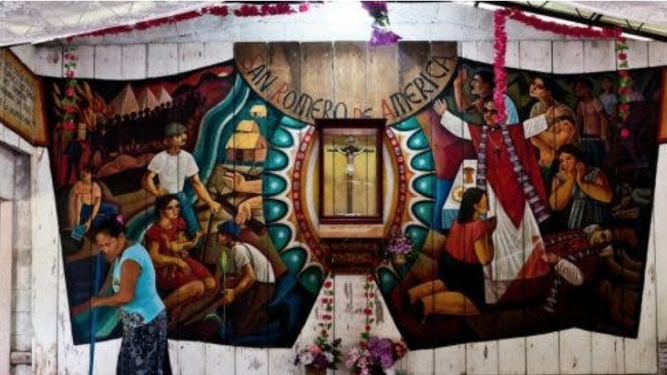
1997: Return to Ecuador to attend national and Latin American CEBS
Back in Ecuador, I successively took charge of 2 parishes in poor areas of the capital Quito, in the Andes and Sucumbíos in the Amazon. Upon resuming my participation in local and national CEBs, I am tasked with training CEB advisors and facilitators. I also work in a “Faith and Politics Training Center” in Quito, with Christians involved in social and political organizations in the country.
Then I participated, at the request of the Continental Articulation of CEBs, as a tutor in charge of the students of the Latin American Virtual School of Biblical-Pastoral Formation, in connection with a Catholic University of Mexico.
For 15 years, I have been an editorial writer, once a week, in a national newspaper (for 10 years) and in several national and international sites.
The past 12 years, I have been retired in Guayaquil, that is, without parish charge. I continue to accompany, on the one hand, the CEBs for training at the national and Latin American level and, on the other hand, social and political organizations.
Conclusions
In my opinion, the mission of the “priests without borders” Fidei donum consists of collaborating in the construction of the Church of the poor in Latin America, in line with the Council and the Latin American Episcopal Conferences.
I think that the impact of my work, I would also say of our work, in France seems minimal to me. I regret it, because our sending to Latin America was for an exchange of experiences between the Churches. I believe that the bishops of France, with rare exceptions, have not been sufficiently open to our double mission.

As for Synodality, it is the implementation of the Church of the poor as a Church in the hands of the laity of which the poor are the protagonists. This is the new ecclesial model represented by the CEB, qualified by the Ecclesial Assembly of Latin America and the Caribbean (Mexico, 2021) as a “synodal Church model.” The CELAM Document, on this topic, has been recognized by the Pope as a “laboratory of Synodality in the Church.”
Inculturation in the Catholic Church, advocated in 1992 in Santo Domingo (Dominican Republic) by the Latin American Episcopal Conference, and interculturality between different religions have made very little progress . “No Ecuador without Indians, no Church without Indians,” they said in Quito, in 1992, during their uprising. Currently, secularization is advancing very rapidly among the younger generations.
Regarding Liberation Theology , I would say that it continues to be alive and diverse despite the ecclesiastical and governmental persecutions that disqualify and make it invisible for many people.
The great challenge that worries me
In our Church, it is about recognizing the values of the various current spiritualities, promoting them among the young generations, valuing their human and religious expressions… and helping Christians and people of good will to enter into this dynamic.
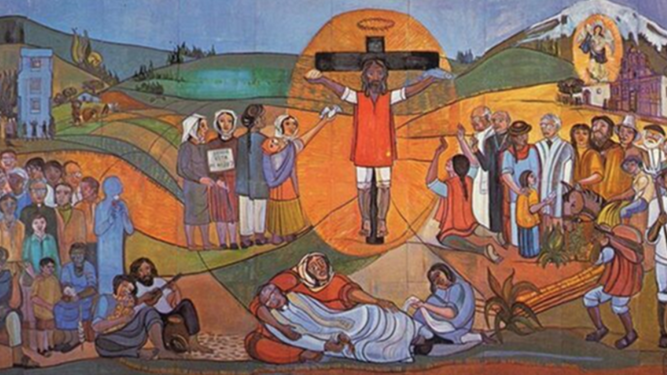
Christ with the poncho. Painting by Adolfo Pérez Esquivel, from Argentina, in the cathedral of Riobamba, Ecuado. This painting was offered by the author to Monsignor Leonidas Proaño (+ 1988) in the 1980s. Monsignor Proaño is represented there with a gray poncho in the right group. Monsignor Oscar Romero of El Salvador can be seen in the foreground, center. The artist, Adolfo Pérez Esquivel, was a defender of Human Rights and Nobel Peace Prize winner.
** https://rebelion-org.translate.goog/la-violencia-principal-es-la-del-sistema-neoliberal/
The main violence is that of the neoliberal system
For Christians and men and women of good will, we are enlightened by the Word of God that tells us through Saint Paul: “The roots of all evil are in the ambition for money.”
Pope Francis warned: “The measure of a civilization is seen by how it treats the most vulnerable… Solidarity, in addition to being a moral virtue, is a demand for justice, which requires correcting distortions and purifying intentions.” of unjust systems, also through radical changes of perspective in the sharing of challenges and resources among men and among peoples… Fight the plague of corruption, abuses of power and illegality. More coherence and prophecy is needed in those of us who call ourselves Christians and those who shepherd the Churches.
…we all need to pitch in to achieve the necessary and urgent transformations. Individually, we must live in simplicity, fraternity, sharing and mutual help. The task is also collective, because it is in groups and communities that we can understand, live and act better. Let’s make it a priority to inform ourselves and train ourselves better to be more aware, organized and brave.
By Pedro Pierre | 01/16/2024 | Ecuador
We are in a new confinement to protect ourselves from military violence… because criminal violence was born from the lack of employment. 2 out of every 3 Ecuadorians of working age cannot find work! Generalized corruption at the level of the State infiltrated by drug trafficking, the bias of justice at the highest level, neglected and expensive health and education, the government’s lack of concern for youth, government pacts with criminal gangs to hand over political prisons to their bosses, indiscriminate labor exploitation, hate and lying campaigns by the media… all of this has led to the current situation of chaos.
The government is ‘pursuing’ the consequences and not the causes of violence and young people, guilty and not guilty, are paying the high price of the war on drug crime, when those responsible are the two previous governments – those of “white collar” – that allowed and even facilitated the drug trade so that gangs of young people could kill each other and extort us. The North American embassy warned us that drug trafficking was carried out with the complicity of senior members of the army and police.
The future ‘last generation’ prisons are not going to solve the problems of unemployment, state corruption and the accumulation of wealth in a few hands. Nor the popular consultation of 20 questions! which is nothing more than a smokescreen. Incidentally, they want to increase VAT from 12 to 15%… making all Ecuadorians pay for the lack of state money… Meanwhile there is no talk of collecting the 5,000 million they owe from the banks, neither the 2,000 million from the tax evading companies, nor the 82 million from the Noboa group of debt to the same SRI… rather the always powerful are going to benefit from the new law approved for financial facilities and free zones without labor obligations… The Banks and large financial groups continue to hide their money in tax havens since there is no control of the exit or entry of foreign currency nor any x-ray of the containers that you export bananas and other products from the national posts.
After two governments making agreements with criminals and international drug mafias, obeying North American interests, the results of the perverse system that governs us are visible. Things will continue to get worse with a government of businessmen advised by the IMF (International Monetary Fund) that organizes the looting of the country and raw materials in favor of large multinationals… because they do not want to see or pursue the causes that have led to the current national disaster. However, it is impossible for there to be jobs for young people, a decent life, houses, health, education, progress and tranquility for the majority of Ecuadorians. The amount of remittances sent by migrants has increased because poverty, inequalities and migration have increased. Egoism, indifference, and individualism have also increased and become accomplices and cover-ups of what is happening. All this with the last elections stained with blood with the murder of 8 people by our so-called “national elites.” Now people are asking on social networks and on TV Sur if the assault on the Canal TC Televisión of Guayaquil, which has caused national commotion and panic in the country’s big cities, has not been a show prepared in advance… Anything is possible in my beloved country, unfortunately.
For Christians and men and women of good will, we are enlightened by the Word of God that tells us through Saint Paul: “The roots of all evil are in the ambition for money.” Juan Bautista continues to guide the military: “Do not abuse people, do not make false complaints and be content with your salary.” The prophet Isaiah continues to cry: “Woe to those who make unjust laws and write down the decrees of evil! “They leave the poor of my country without protection, they steal the little ones of their rights, they leave the widow with nothing and despoil the orphan!” The apostle James denounces: “Now it is the turn of the rich: weep and regret… They have known only luxury and pleasures in this world, and they had a great time, while others were murdered.”
In recent days, Pope Francis warned: “The measure of a civilization is seen by how it treats the most vulnerable… Solidarity, in addition to being a moral virtue, is a demand for justice, which requires correcting distortions and purifying intentions.” of unjust systems, also through radical changes of perspective in the sharing of challenges and resources among men and among peoples… Fight the plague of corruption, abuses of power and illegality. More coherence and prophecy is needed in those of us who call ourselves Christians and those who shepherd the Churches.
In the current Ecuadorian reality, we all need to pitch in to achieve the necessary and urgent transformations. Individually, we must live in simplicity, fraternity, sharing and mutual help. The task is also collective, because it is in groups and communities that we can understand, live and act better. Let’s make it a priority to inform ourselves and train ourselves better to be more aware, organized and brave. Spiritually, we have to find in faith and humanism the necessary encouragement to live better personally and build together an Ecuador of brotherhood and progress. Socially, let’s join the people and organizations that are in this dynamic. Either we save each other or we are irremediably lost!
Pedro Pierre: French diocesan priest, accompanies the urban and rural Ecclesial Base Communities (CEB) of Ecuador, a country where he arrived in 1976. Rebelión has published this article with the author’s permission through a Creative Commons license , respecting his freedom to publish it in other sources.
